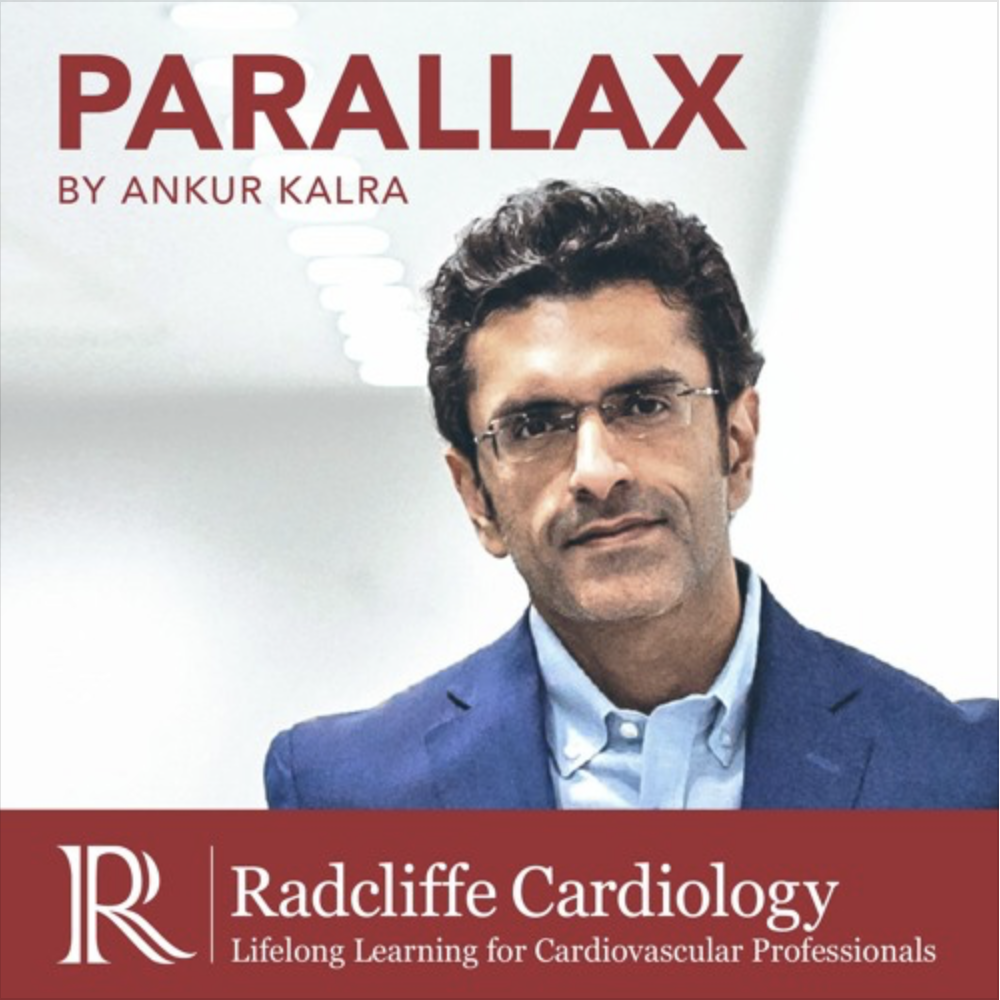
11: 3/3 Burnout & Resilience With Kavitha Chinnaiyan: Practicing Self-Care To Avoid Burnout
What are the key pillars of self-care and what do dirty windshields have to do with it? How can you take meditation “off the matt”? What has chronobiology and Ayurveda taught us about working with, rather than against, our circadian rhythm?
In the final episode of our burnout and resilience series, Kavitha and Ankur give you some practical tools of self-care to help you avoid burnout. Kavitah Chinnaiyan, MD, is an award-winning author and, Cardiologist and Director of Cardiac CT Research at Beaumont Health, MI. Send us your thoughts to this episode for Ankur to share in future episodes: podcast@radciffe-group.com. Guest @ChinnaiyanMD.
Hosted by @AnkurKalraMD. Produced by @RadcliffeCARDIO.
Read MoreRead Less
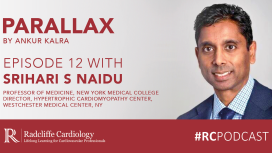
In this episode, Srihari S Naidu shares his career tips for young, ambitious cardiologists and what he has learnt about mentorship from his numerous leadership positions. Hari elaborates on the different types of mentorship, the importance of developing non-academic skills, why you should focus on your strengths rather than weaknesses, and the fickle art of managing one’s public/private personas as a young cardiologist in an era of social media.
Having recently applied for the programme himself, Ankur also speaks with Hari about the history, purpose and future of the Society for Cardiovascular Angiography and Interventions (SCAI) Emerging Leader Mentorship (ELM) Fellowship Programme. Submit your question to: podcast@radciffe-group.com. Guest @SrihariNaiduMD.
Hosted by @AnkurKalraMD. Produced by @RadcliffeCARDIO.
Read More
Having recently applied for the programme himself, Ankur also speaks with Hari about the history, purpose and future of the Society for Cardiovascular Angiography and Interventions (SCAI) Emerging Leader Mentorship (ELM) Fellowship Programme. Submit your question to: podcast@radciffe-group.com. Guest @SrihariNaiduMD.
Hosted by @AnkurKalraMD. Produced by @RadcliffeCARDIO.
All Episodes

In this thought-provoking episode of Parallax, Host, Dr Ankur Kalra engages in an illuminating conversation with Dr Karen Joynt Maddox, a distinguished cardiologist and health policy researcher at Washington University School of Medicine in St. Louis. Together, they navigate the complex intersection of cardiovascular medicine, health economics, and public health policy.
Read More

In this week's episode of Parallax, host Dr Ankur Kalra engages in a thought-provoking discussion with Dr Stephen Smith, a pioneer in electrocardiography and myocardial infarction diagnosis. They delve into the groundbreaking OMI/NOMI paradigm (Occlusion MI vs Non-Occlusion MI), challenging the traditional STEMI vs non-STEMI terminology that has long been the cornerstone of acute coronary syndrome management.
Read More

In this episode, Dr Aggarwal shares insights from her groundbreaking Family Intervention Trial for Heart Health (FIT Heart) study, unveiling the crucial role of social support and caregiver dynamics in maintaining healthy behaviours. Dr Kalra and Dr Aggarwal discuss innovative techniques such as motivational interviewing and cognitive behavioural therapy that are transforming the landscape of nutrition counselling.
Read More
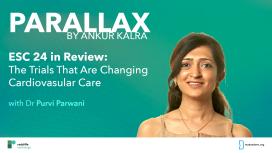
In this episode of Parallax, Dr Ankur Kalra reunites with Dr Purvi Parwani for a deep dive into the groundbreaking data unveiled at ESC Congress 2024.
Read More
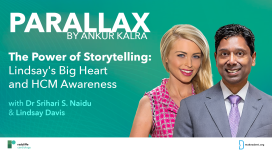
In this week's episode, Dr Ankur Kalra welcomes authors Dr Srihari Naidu and Lindsay Davis to discuss their newly published children's book, Lindsay's Big Heart. A leading interventional cardiologist, Dr Naidu, and patient advocate, Ms Davis, have collaborated to bring the complex heart condition hypertrophic cardiomyopathy (HCM) to life for young readers.
Read More
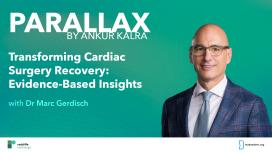
This week on Parallax, Dr Ankur Kalra welcomes Dr Marc Gerdisch to discuss a groundbreaking study on reducing opioid use after cardiac surgery.
Dr Gerdisch shares insights into his research on rigid sternal fixation and enhanced recovery protocols, which have shown promising results in postoperative pain management and patient recovery.
Read More
Dr Gerdisch shares insights into his research on rigid sternal fixation and enhanced recovery protocols, which have shown promising results in postoperative pain management and patient recovery.
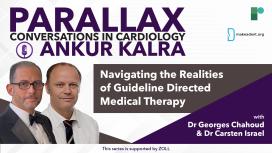
EP 116: Navigating the Realities of Guideline Directed Medical Therapy with Dr Chahoud and Dr Israel
In this enlightening episode of Parallax, which focuses on guideline directed medical therapy (GDMT), Dr Ankur Kalra is joined by two guests, Dr Georges Chahoud, a Heart Failure Cardiologist at St. Louis Cardiology Consultants in the US, and Dr Carsten Israel, Chief of Cardiology at Bethel-Clinic in Germany.
Read More
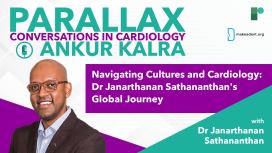
In this compelling episode of the Parallax Podcast, host Dr Ankur Kalra sits down with Dr Janarthanan Sathananthan, an interventional and structural cardiologist and the Chief Medical Officer of Interventional Cardiology at Boston Scientific. Dr Sathananthan recounts his life's journey, from being born in Sri Lanka during the civil war, and moving to Zimbabwe, New Zealand, Canada, and finally North America. He shares how his diverse upbringing profoundly shaped his career in cardiology.
Read More
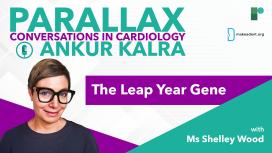
In this week’s Parallax, Dr Ankur Kalra welcomes back Shelley Wood, best known for her work in the cardiology community as the editor-in-chief of TCTMD and Editorial Director of CRF. They discuss her work as a creative author and her second novel, "The Leap Year Gene," set to be published by Harper Collins in Canada and Union Square Press in the US in August 2024.
Read More

This special episode dives deep into the crucial topic of radiation hygiene, exploring it from the perspectives of both manufacturers and users of radiation safety products.
Read More

Martha Gulati, Professor of Medicine and the Chief of Cardiology at the University of Arizona joins Ankur Kalra to continue the important conversation on how the cardiovascular community can stand up against sexism.
After the #MedBikini campaign provoked by a misogynistic study that scrutinized female doctors’ social media posts, this episode is about creating a safer environment for female healthcare professionals.
Read More
After the #MedBikini campaign provoked by a misogynistic study that scrutinized female doctors’ social media posts, this episode is about creating a safer environment for female healthcare professionals.

This week’s guest, Prof Roxana Mehran, Professor of Medicine at Mount Sinai and Founding Director of Women as One, is a phenomenon in interventional cardiology. Her pioneering work as clinician, trialist and advocate is well known within the community. In this episode, we learn what makes Roxana tick and what were the odds she had to defy as an immigrant from Iran to fulfil her ‘impossible dream’.
The charity organisation, Women as One is an agent for women and men to be part of medicine that is built on talent, rather than a privilege. Roxana and Ankur discuss the role of mentorship and family-friendly work environment in mending the broken house of cardiology. Roxana talks about the practical tools that are available for women to take the next steps in their career and achieve their goals.
Read More
The charity organisation, Women as One is an agent for women and men to be part of medicine that is built on talent, rather than a privilege. Roxana and Ankur discuss the role of mentorship and family-friendly work environment in mending the broken house of cardiology. Roxana talks about the practical tools that are available for women to take the next steps in their career and achieve their goals.

This week’s guest is Dr Laura Mauri who became Vice President of Global Clinical Research and Analytics at Medtronic in 2018 after an illustrious career in academic medicine at Brigham and Women’s Hospital and Harvard Medical School.
Dr Kalra asks Dr Mauri about early influences and her traineeship with legendary interventionalists, the late Donald Baim and Richard Kuntz. Dr Mauri talks openly about her decision-making process and the importance of selecting your priorities and committing to them. Ankur asks Laura about her decision to go into industry. Laura shares her thoughts on medical innovations and meeting urgent needs with unique perspectives.
What is Dr Mauri’s advice for a young cardiologist? How did she balance research and patient care? What are the questions that helped her decision making? How does Dr Mauri think about innovations in medicine?
Read More
Dr Kalra asks Dr Mauri about early influences and her traineeship with legendary interventionalists, the late Donald Baim and Richard Kuntz. Dr Mauri talks openly about her decision-making process and the importance of selecting your priorities and committing to them. Ankur asks Laura about her decision to go into industry. Laura shares her thoughts on medical innovations and meeting urgent needs with unique perspectives.
What is Dr Mauri’s advice for a young cardiologist? How did she balance research and patient care? What are the questions that helped her decision making? How does Dr Mauri think about innovations in medicine?

In the early days of the Black Lives Matter movement, a group of internal medicine residents posed a question: What can we do about racial disparity within our institution?
Brigham and Women’s Hospital’s Health Equity Committee decided to confront the status quo by asking: How is racism on a structural level present within our walls?
Ankur Kalra’s guests Michelle Morse (Founding Co-Director of EqualHealth and Assistant Professor at Harvard Medical School) and Lauren Eberly (Cardiology Fellow at the University of Pennsylvania) are co-authors of a retrospective study that demonstrated what had previously only been observed: That black or brown heart failure patients ended up in general medicine rather than specialised cardiology services. Following the publication of the study in November 2019, the Health Equity Committee started to roll out anti-racism trainings and to work on objective admission guidelines to mitigate biased behaviours.
Aarti Bhatt (Assistant Professor of Medicine at the University of Minnesota), member of the Minnesota chapter of Campaign Against Racism, talks about their initiative to support projects that have a positive impact on local communities on a global scale.
Read More
Brigham and Women’s Hospital’s Health Equity Committee decided to confront the status quo by asking: How is racism on a structural level present within our walls?
Ankur Kalra’s guests Michelle Morse (Founding Co-Director of EqualHealth and Assistant Professor at Harvard Medical School) and Lauren Eberly (Cardiology Fellow at the University of Pennsylvania) are co-authors of a retrospective study that demonstrated what had previously only been observed: That black or brown heart failure patients ended up in general medicine rather than specialised cardiology services. Following the publication of the study in November 2019, the Health Equity Committee started to roll out anti-racism trainings and to work on objective admission guidelines to mitigate biased behaviours.
Aarti Bhatt (Assistant Professor of Medicine at the University of Minnesota), member of the Minnesota chapter of Campaign Against Racism, talks about their initiative to support projects that have a positive impact on local communities on a global scale.

Heart surgery is not the best option for every patient suffering from structural heart disease. This was recognized by interventional cardiologist Anmar Kanaa’N and cardiac surgeon Joseph Lahorra who decided to unify their skillsets and bring the Structural Heart Program to life. Their vision was to offer patients with heart valve diseases all available options at Cleveland Clinic’s Akron General.
In this week’s Parallax, Dr Kanaa’N, the director of the program, and Dr Lahorra, chairman of the Heart, Vascular & Thoracic Department of Akron General introduce the listeners to the foundations of their program and the paradigm shift brought by TAVR.
Read More
In this week’s Parallax, Dr Kanaa’N, the director of the program, and Dr Lahorra, chairman of the Heart, Vascular & Thoracic Department of Akron General introduce the listeners to the foundations of their program and the paradigm shift brought by TAVR.





